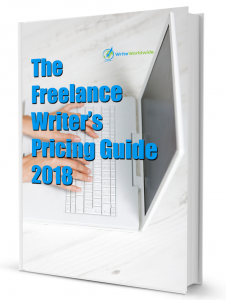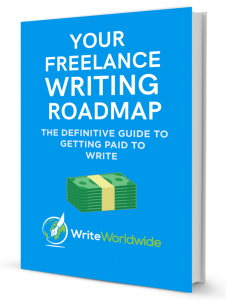Hi WriteWorldwide readers, and welcome to the latest in our series of inspirational and advice-packed interviews with professional freelance writers.
Today’s interview is with Mridu Khullar Relph—founder of one of our favourite sites for freelance writers, The International Freelancer.
Keep reading to find out her advice for aspiring freelance writers …
1) Hi Mridu, please tell us a little about yourself and your website.
I’m a storyteller and a traveler at heart. I’ve been a journalist for 15+ years writing for publications such as The New York Times, TIME, CNN, ABC News, The Independent, Elle, Vogue, Cosmopolitan, Elle, Entrepreneur, and more. I’ve lived and worked from four continents and several different countries. I currently call both London and New Delhi home.
I’m also the founder and editor of The International Freelancer (http://www.TheInternationalFreelancer.com), a website that helps writers make a fantastic living, tell meaningful stories, and find financial freedom from anywhere in the world.
2) Did you grow up wanting to be a writer? And how did you break into the industry?
I was a college student in India, studying engineering, and I had just failed my first year. I was looking for things to do as I retook my exams and the words of my English teacher, who had always told me to explore writing, echoed in my head. I looked for resources online, pitched a story to a US-based magazine for college students on surviving failure in college, and got an assignment. A cool $100 later, I was hooked.
3) How long after deciding on this career did you establish yourself as a full-time writer?
Pretty much immediately. As I said, I was a college student in Delhi when I first decided to become a writer. It was 2002. Within the week, I had learned about query letters and started sending five per day. I also started working on a novel, which eventually went nowhere.
When I decide to go after something, I typically do so with gusto. I pitched and I wrote on a regular basis. By the time I graduated three years later, I’d already worked at a national magazine in India, created a profitable online business, and been making a full-time living with my writing for two years.
Graduation was a formality—I was already a full-time professional writer by the time I finished college.
4) What’s your opinion on the subject of choosing a writing niche?
I feel it’s helpful to be a generalist in the first few years of your writing career, not only so that you can spread your net wide and be available to a variety of editors and clients, but also so that you have a chance to see what you excel at and what kind of writing appeals to you.
Who knows what you’re going to find—you might become a greeting card writer who pens one-liners for a living, you might be interested in writing for children or teenagers, you might find that you actually enjoy business writing and want to focus your energy there. Or, like so many others, you might get your start in non-fiction but then realise your calling is in writing novels instead.
Once you’ve decided though, I think the market sort of forces you to specialise and that’s a good thing. When editors I work with want a business writer, they have a few names that come up repeatedly. Similarly, there are those journos who excel at hard news, those who are really good with celebrity profiles, others who are more interested in investigative features.
It helps editors to compartmentalise their writers because they know who to go to for what, and it helps writers to be top of mind in certain subject areas.
Don’t you immediately think of Michael Pollan when talking about food systems. Doesn’t Amy Tan come to mine when you’re asked for recommendations on Chinese-American fiction?
Specialisation doesn’t necessarily need to have a narrow scope, but it helps if people can define what you do. And of course, you can always keep changing that definition.
5) Winning new clients is always a hot topic on the WriteWorldwide blog. What’s the most effective prospecting method you’ve used to find new work?
I love querying and it’s been the most fruitful way for getting work for me as well but that’s mostly because I do international reporting for national and international newspapers and magazines.
For content marketing and blogging, I recommend Letters of Introduction, specifically on LinkedIn.
And if you want to work with small businesses, setting up one-on-one meetings, whether in person or through Skype is the best approach, in my experience.
When looking for work, put yourself in the client’s shoes. How are they most likely going to want to be contacted? What do they need to know in order to give you work? What modes of communication are they most likely to respond favourably to? Then go from there.
6) What do you wish you’d known at the start of your freelance writing career?
I wish I hadn’t listened to all the experts and the advice about starting with local publications and the “realistic” advice about freelancing not being a viable career.
I was told I couldn’t do it from India. I was told it was impossible to make a decent living with it. I was told you could chase the awards or the money but not both. I was told that if you wrote stories about social issues, you wouldn’t get paid for that work. My highest-paying assignments have been about human rights issues.
The hardest thing for me, personally, was learning to trust my gut and to allow myself to follow my own path, even if that meant that I had falls along the way. Because now I am proof that it doesn’t have to be love or money. For me, it is both.
7) Name one book, one tool, and one article that have helped you in your writing career.
One book: The Art and Craft of Feature Writing by William E. Blundell
One tool: Scrivener
On article: The Power of Leads: https://www.poynter.org/news/power-leads
8) Keeping motivated can be tough for many freelance writers. How do you keep yourself motivated and productive as a writer?
I have deadlines from editors and I have self-imposed deadlines from me. I think it helps to have set hours for working as well because then you know there’s a limit to how much Facebook or Twitter you can get away with.
I don’t typically like working weekends, but if I don’t meet my deadlines, I know that I’ll have to. So I try and get started on things when I can.
With bigger projects, I tend to break them up into parts and I give myself deadlines for each part so that I can see if I’m getting off track at any point. I love finishing things and getting that little thrill of having accomplished something and so I build in opportunities to finish regularly in my days and weeks.
9) Who are your biggest influences and people you admire in the freelance writing industry?
I tend to be more inspired by pieces of work than people in general. So I’m more likely to see a really good piece of writing and be influenced by its history—how did the writer come across this story, how did they pitch it, how did they report it, etc.
I look at the Pulitzer website frequently as well as “Best of” writing books and find stories in there that catch my interest. It’s a great way to learn from the best writers by just following the trajectory of their work and their writing.
Gene Weingarten’s stories typically fit into this category. This is one of his stories that made a big impact on me and influenced my writing.
(Warning: It’s not easy reading.)
10) What does the future hold for you – are you involved in any writing projects other than freelancing?
I’m now making the transition into books. My first novel is in my agent’s hands, I’ve begun work on the second novel, and I’m also in the process of putting a proposal together for an authorized celebrity biography.
In addition, I’m working on a huge project of my own, which is to put together a series of 40-50 books on the art, craft, and business of freelance writing, through The International Freelancer. We’re publishing one a week starting this month and the initial response to the books has been phenomenal.
You can see them here: http://www.mridukhullar.com/books-for-writers/
On the business side of things, we’ve recently shut down all the courses that we offered at The International Freelancer and are putting all our focus into our membership community, The Finishers. http://theinternationalfreelancer.com/finishers
We’re also putting together tons of free resources that will help writers make a living, such as this list of 70+ publications that pay $1 a word: http://www.theinternationalfreelancer.com/1-a-word/



